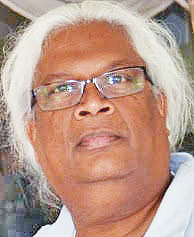Opinions
Sabre-rattling

Modi’s re-election should increase his confidence in tackling the devils, local and foreign, that are keeping India down. Two of the more difficult challenges are to purge the land of corruption, and to wean middle class and gotra-immersed Indians from America/UK-centrism, and to support nation-building, to make India great again, as it once was, a task that requires interpersonal cooperation locally, and cultivation of friendships based on mutual respect, tolerance of differences, and give-and -take. Bullying is not acceptable for individuals, nor for nations, as currently done by Trump and the prime candidates for UK leadership.
Also inexcusable is the use of agents of hate or enmity to create or aggravate internal conflict in any country, an easy thing to do in a crowded nation with inter-religious fault lines and economic weaknesses; in this context, the magnitude and spread of conversion programs in India threaten Indian culture, essential for revival, as they erode the fabric of the Dharmic religions, community integrity and Islam. Foremost among them is the US-based Joshua project, about which I had commented five years ago in my book on India. The project has grown stronger and richer in its aim to christianise all Indians, in much the same way as the early Roman church had destroyed the religions of the Romans and northern Europeans since the Middle Ages, and systematically annihilated those, although Christians in the real sense, who did not conform to Roman orthodoxy, or more aptly, hegemony, e.g. the exemplary Cathcar culture of SW France.
”Joshua” is heavily funded, buys converts for a pittance, subjugates then trains them to be aggressive and persuasive evangelicals; using data from thorough studies of the of the vulnerabilities of Indian society and its government. It freely dismisses local culture and substitutes its own, teaching Christianity as the progenitor of Dharmic philosophy, usurped by the Hindus, who came after Christ; this doctrine is militantly promoted by brain-washed converts, who, as native evangelists, can penetrate more easily into ethnic enclaves for a more intimate and empathetic dialogue. The project abuses India’s tolerance. It could not get to bat, much less to first base, in Islamic countries.
President Trump has shown racist biases from the start, and has now affirmed it with bigoted remarks re the unwelcome origins of four younger female Democrats: Alexandria Ocasio-Cortez of New York, Ilhan Omar of Minnesota, Rashida Tlaib of Michigan, and Ayanna S. Pressley of Massachusetts, suggesting that they didn’t belong in the USA. In commenting, Trudeau while avoiding the term “racist” said, “That is not how we do things in Canada. A Canadian is a Canadian is a Canadian. The diversity of our country is actually one of our greatest strengths and a source of tremendous resilience and pride for Canadians and we will to continue to defend that." But there should be no surprise at Trump’s behaviour; lying, abusing, condemning, bullying, threatening, have been Trump’s trumps, of which he seems to have an endless supply.
His salvos against countries are also well-known, and would be ludicrous if he did not sit a hand’s reach from world destruction. WWII did nothing, it seems, to enlighten Americans; instead, they turned to educating their young, the boomers who lead today, on self-esteem at the cost of imparting knowledge and love of learning, which a “great” nation should do, if it wanted to be great! Tirades against Iran are “words of war”, especially urged on by John Bolton, the man who insisted that Iraq had weapons of mass destruction, long after that allegation was convincingly disproved. Reality is a fake to these men, who will blithely take the world to Armageddon, simply because they are ignorant and wilful, and have unopposed power to create havoc.
When India agreed to buy Russia’s S-400 missile defence system, Trump and his troupe immediately began arm-twisting Modi to buy American, or else face sanctions; there is no room for independent choices in Trump’s world. ‘Make America great again’ becomes just another bullying call!
Russia and India have cooperated for decades in economics, business, military matters, and space exploration; Rakesh Sharma, the first Indian in space, travelled the Russian Soyuz T-11 vehicle in 1984. Russian help often involved technology transfer, while the USA’s does not. Thus the dialogue between India and Russia is decidedly warmer than with the unpredictable narcissists at the White House. Note that July 20th is the 50th anniversary of the Soviet 'Lunokhod’ moon landing. India’s attempt to repeat that has just been postponed.
”Joshua” is heavily funded, buys converts for a pittance, subjugates then trains them to be aggressive and persuasive evangelicals; using data from thorough studies of the of the vulnerabilities of Indian society and its government. It freely dismisses local culture and substitutes its own, teaching Christianity as the progenitor of Dharmic philosophy, usurped by the Hindus, who came after Christ; this doctrine is militantly promoted by brain-washed converts, who, as native evangelists, can penetrate more easily into ethnic enclaves for a more intimate and empathetic dialogue. The project abuses India’s tolerance. It could not get to bat, much less to first base, in Islamic countries.
President Trump has shown racist biases from the start, and has now affirmed it with bigoted remarks re the unwelcome origins of four younger female Democrats: Alexandria Ocasio-Cortez of New York, Ilhan Omar of Minnesota, Rashida Tlaib of Michigan, and Ayanna S. Pressley of Massachusetts, suggesting that they didn’t belong in the USA. In commenting, Trudeau while avoiding the term “racist” said, “That is not how we do things in Canada. A Canadian is a Canadian is a Canadian. The diversity of our country is actually one of our greatest strengths and a source of tremendous resilience and pride for Canadians and we will to continue to defend that." But there should be no surprise at Trump’s behaviour; lying, abusing, condemning, bullying, threatening, have been Trump’s trumps, of which he seems to have an endless supply.
His salvos against countries are also well-known, and would be ludicrous if he did not sit a hand’s reach from world destruction. WWII did nothing, it seems, to enlighten Americans; instead, they turned to educating their young, the boomers who lead today, on self-esteem at the cost of imparting knowledge and love of learning, which a “great” nation should do, if it wanted to be great! Tirades against Iran are “words of war”, especially urged on by John Bolton, the man who insisted that Iraq had weapons of mass destruction, long after that allegation was convincingly disproved. Reality is a fake to these men, who will blithely take the world to Armageddon, simply because they are ignorant and wilful, and have unopposed power to create havoc.
When India agreed to buy Russia’s S-400 missile defence system, Trump and his troupe immediately began arm-twisting Modi to buy American, or else face sanctions; there is no room for independent choices in Trump’s world. ‘Make America great again’ becomes just another bullying call!
Russia and India have cooperated for decades in economics, business, military matters, and space exploration; Rakesh Sharma, the first Indian in space, travelled the Russian Soyuz T-11 vehicle in 1984. Russian help often involved technology transfer, while the USA’s does not. Thus the dialogue between India and Russia is decidedly warmer than with the unpredictable narcissists at the White House. Note that July 20th is the 50th anniversary of the Soviet 'Lunokhod’ moon landing. India’s attempt to repeat that has just been postponed.
Abandoned crane eats boyhood hours
 Romeo Kaseram
Romeo Kaseram
In the now faraway homeland where I grew up back home, the owner of a construction company decided one day the time had come to abandon in the prime estate of our boyhood the tremendous iron tonnage of an aging, heavy-lifting boom crane.
The field he chose to off-load this immovable mass of scrap iron was our boyhood stomping ground, since this was a time before environmental rules, and the owner was so wealthy and influential that the laws of the land and decent behavior did not apply to him and members of his family.
It was also an unhappy hunting ground, mainly for worms of this earth unlucky to be unearthed for a surreptitious and spontaneous fishing trip. However, this field was also a source of good fortune for generations of birds of the air and fowls that roosted in the trees, and which laid dozens of free-range eggs a day in the tall grass, since our slingshot aim always missed its targets. Easily described as far encounters of the feathered kind, the velocity and range of our deployed missiles, typically a chipped marble, or a river-polished and rounded stone, were always wayward enough to miss, but mostly landed us in trouble with neighbours who valued immaculately shiny glass windowpanes as reflections of wealth and prestige.
Overrun with razor grass, tough shrubs, and an occasional thriving flower, this field was where the neighbourhood dogs gathered to bay at nights when the moon was full, jaundiced, and as spoiled as cheese. In those times, when the cycle of life was at the top with renewal, a dog-friend or two from another village that had accurately sniffed the air, joined the pack in hounding reluctant participants to bring forth litters of puppies as bundles of joy into this world.
It was in our field of dreams where mice trembled with trepidation when sedentary and overweight cats, which opportunistically pounced on exposed plates of butter, or clawed open pots to surreptitiously explore warm curries and stews while owners dozed during the humid afternoons, were shooed trundling out of houses with either end of a broom to perform a good turn in life and do a bit of hunting. The result was a return to the houseowners in feline investments a currency of disemboweled prey with glazed, dead eyes, left as horrifying, taxing recompense on immaculate kitchen floors.
This field was always our general gathering place for solace and comfort after fed-up parents drove us from houses with chores. We homed in here, landing one after the other like trained pigeons to assess the gathered loot of seasonal fruits: green mangoes indelibly staining the inside of caps; cherries so acidic it burned a hole in a trouser pocket if bruised during its purloining, enough to permanently scar the legs like tattoos; and those occasional, but more valuable and sweet-as-sugar mandarins with its green skin, which with its weird etymological nomenclature, we called a “Portugal” without knowing this was a country in south western Europe.
It was in the multi-purposed field where we discovered the carcass of the abandoned crane one morning. We arrived in a field changed, the tall grasses trampled so our hiding spots were now easily discernible to a parent’s seeking and punitive eye. The ground under our feet had been churned enough so a cricket ball could no longer freely roll, or a soccer ball kicked without strenuous effort.
Our precious field was a battlefield. It seemed as if a tremendous struggle had been waged overnight, with tracks deeply embedded in the ground, and chunks of sod lifted as if the giant, clawed feet of large birds had ploughed deeply into the turf after coming in for a landing. Giant footprints had been left behind, impressions we knew would eventually fill with rainwater, and where croaking frogs would soon be hoarsely pestering reluctant participants to start a renewal cycle of tadpoles fleeing clumsily at the sound of approaching footsteps.
The corpse of a fallen giant lay before us. The bulk of the rusting body was nauseating with its spilled fluid of diesel, its mangled tracks revealing an internal vascular structure torn, irreparable, and dripping. The lengthy boom was parallel with the ground, with its lattice of bolted iron bars ripped and torn like a beast’s neck in the tall grass. The decapitated iron hook at the end of the boom lay unmoving in a tangle of cables, seemingly torn and shredded ligaments.
We clambered onto the colossus with guttural victory cries, a struggle immediately ensuing among the stronger boys to claim the heart of the beast, which was sitting at the controls in the cab, with its windows broken, and manoeuvring the steering, pedals, and levers. Soon a dangerous acrobatic game developed, the braver among us attempting to outdo competitors in keeping balanced while negotiating on the narrow iron struts along the lengthy boom.
Weeks later, we had forgotten about the joys of boyhood industry and thievery, our games of cricket and soccer, as we attempted to disembowel the fallen, abandoned giant, salvaging whatever we could lift and carry away.
Overrun with razor grass, tough shrubs, and an occasional thriving flower, this field was where the neighbourhood dogs gathered to bay at nights when the moon was full, jaundiced, and as spoiled as cheese. In those times, when the cycle of life was at the top with renewal, a dog-friend or two from another village that had accurately sniffed the air, joined the pack in hounding reluctant participants to bring forth litters of puppies as bundles of joy into this world.
It was in our field of dreams where mice trembled with trepidation when sedentary and overweight cats, which opportunistically pounced on exposed plates of butter, or clawed open pots to surreptitiously explore warm curries and stews while owners dozed during the humid afternoons, were shooed trundling out of houses with either end of a broom to perform a good turn in life and do a bit of hunting. The result was a return to the houseowners in feline investments a currency of disemboweled prey with glazed, dead eyes, left as horrifying, taxing recompense on immaculate kitchen floors.
This field was always our general gathering place for solace and comfort after fed-up parents drove us from houses with chores. We homed in here, landing one after the other like trained pigeons to assess the gathered loot of seasonal fruits: green mangoes indelibly staining the inside of caps; cherries so acidic it burned a hole in a trouser pocket if bruised during its purloining, enough to permanently scar the legs like tattoos; and those occasional, but more valuable and sweet-as-sugar mandarins with its green skin, which with its weird etymological nomenclature, we called a “Portugal” without knowing this was a country in south western Europe.
It was in the multi-purposed field where we discovered the carcass of the abandoned crane one morning. We arrived in a field changed, the tall grasses trampled so our hiding spots were now easily discernible to a parent’s seeking and punitive eye. The ground under our feet had been churned enough so a cricket ball could no longer freely roll, or a soccer ball kicked without strenuous effort.
Our precious field was a battlefield. It seemed as if a tremendous struggle had been waged overnight, with tracks deeply embedded in the ground, and chunks of sod lifted as if the giant, clawed feet of large birds had ploughed deeply into the turf after coming in for a landing. Giant footprints had been left behind, impressions we knew would eventually fill with rainwater, and where croaking frogs would soon be hoarsely pestering reluctant participants to start a renewal cycle of tadpoles fleeing clumsily at the sound of approaching footsteps.
The corpse of a fallen giant lay before us. The bulk of the rusting body was nauseating with its spilled fluid of diesel, its mangled tracks revealing an internal vascular structure torn, irreparable, and dripping. The lengthy boom was parallel with the ground, with its lattice of bolted iron bars ripped and torn like a beast’s neck in the tall grass. The decapitated iron hook at the end of the boom lay unmoving in a tangle of cables, seemingly torn and shredded ligaments.
We clambered onto the colossus with guttural victory cries, a struggle immediately ensuing among the stronger boys to claim the heart of the beast, which was sitting at the controls in the cab, with its windows broken, and manoeuvring the steering, pedals, and levers. Soon a dangerous acrobatic game developed, the braver among us attempting to outdo competitors in keeping balanced while negotiating on the narrow iron struts along the lengthy boom.
Weeks later, we had forgotten about the joys of boyhood industry and thievery, our games of cricket and soccer, as we attempted to disembowel the fallen, abandoned giant, salvaging whatever we could lift and carry away.
